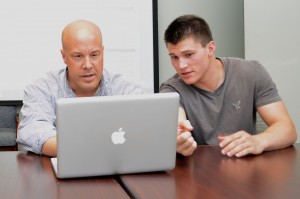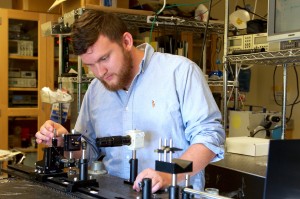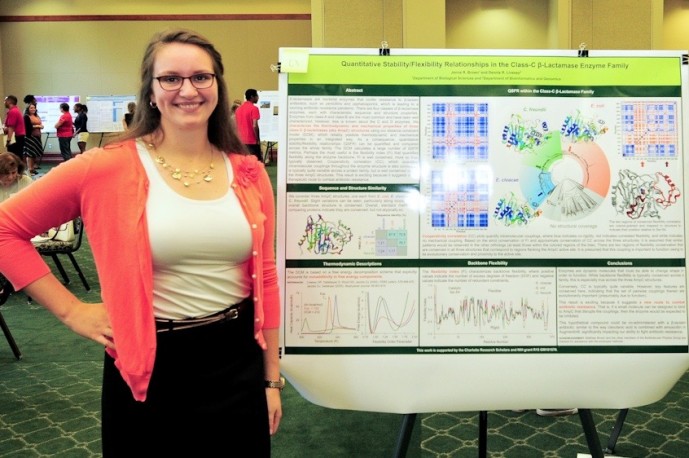As first author of a research paper in the prestigious academic journal PLOS ONE, biology undergraduate and Charlotte Research Scholar Jenna Brown picked up an impressive honor – and a new nickname.
“Becoming a published author as an undergraduate student still feels surreal to me,” says Brown, who co-authored the paper with mentor Dennis Livesay, bioinformatics and genomics professor. “It was fun being able to share the news with my family and friends, who now refer to me as “Scientifically Suitable” after hearing about reviewers’ comments.”
Brown is one of hundreds of UNC Charlotte undergraduates who have participated in the Charlotte Research Scholars initiative at UNC Charlotte. Each summer, students apply for the 10-week program. Those chosen receive a scholarship to work closely with faculty mentors conducting research. They also participate in professional development sessions to better prepare them for graduate school and careers.
Brown is embracing the serious side of her nickname, using these early research opportunities as fuel for her passion. “The paper was never meant to be the end point for me, though it was certainly a goal,” she says. “The most exciting part of this for me is that it isn’t over.”
The work has made progress in the search for a weak spot in the architecture of a group of enzymes that are essential to antibiotic resistance in a number of bacteria, using a complex modeling program that helps analyze the physical dynamics of large, structurally complex protein molecules.
“This work was the first research experience I had, and for me it involved a learning curve,” Brown says. “I have gained confidence in my ability to function as a part of a professional academic team, become more comfortable with computers, developed into a seasoned public speaker, and gained a better understanding of what I hope to do post-graduation.”
A senior, she is currently applying to pharmacy schools, marrying her love of chemistry and biology with her interest in a medical career.
 Another Charlotte Research Scholar, Henry Tigri, worked with mentor Michael Turner, a professor in the Criminal Justice and Criminology Department, to research the relationship between gang membership and firearms and bully victimization and firearms.
Another Charlotte Research Scholar, Henry Tigri, worked with mentor Michael Turner, a professor in the Criminal Justice and Criminology Department, to research the relationship between gang membership and firearms and bully victimization and firearms.
“Dr. Turner became a great mentor, in research specifically, criminology broadly and in life in general,” says Tigri, who graduated with degrees in criminal justice and psychology. “My role included selecting our research topic, discussing how we might get answers to our research questions, collecting data, and analyzing that data. Dr. Turner gave me the reins, but worked with me to explain the processes, including how to work with the statistical software.”
Tigri published two papers, one with fellow student Jennifer Devinney, in the American Journal of Criminal Justice and the International Journal of Offender Therapy and Comparative Criminology. His research experiences stood out when he applied to graduate school, he says, and he currently is pursuing his master’s degree in accounting at Florida State University.
“Research teaches analytical and critical thinking, problem solving, troubleshooting, attention to detail and other skills,” he says. “I would go so far as to say that my research experience has taught me more usable skills that are applicable in the real world and the working world than the rest of my undergraduate education as a whole.”
 Like Tigri and Brown, physics student Luke Hardy worked closely with his mentor, physics and optical science professor Nathaniel Fried, researching the thulium fiber laser as an alternative to conventional lasers. Their work has resulted in papers in major journals and conference presentations.
Like Tigri and Brown, physics student Luke Hardy worked closely with his mentor, physics and optical science professor Nathaniel Fried, researching the thulium fiber laser as an alternative to conventional lasers. Their work has resulted in papers in major journals and conference presentations.
“Carrying out research is not just sitting in a lab and doing experiments,” says Hardy, who now is pursuing his doctoral degree in optical science and engineering at UNC Charlotte. “A big part is explaining what you do, why it is important, and how you are able to do it. Being faced with multiple situations where I had to explain what I was doing in front of audiences has helped me overcome my fear of public speaking.”
Fried meets with students each day to discuss individual projects, which keeps the pace moving, Hardy says.
“All research has its dead ends and hard decisions; it wouldn’t be research if it didn’t,” he says. “Because Dr. Fried talks with us frequently, it helps us decide on the best path possible with our research. The hands-on aspect of the lab helps you visualize and attack problems in the classroom a lot easier.”
Hardy knew he wanted to use his knowledge and interest in engineering and science to help others.
“My father had a serious issue from a urinary stone blocking his urinary tract,” he says. “He was in the hospital for a while and needed surgery to remove the stone. I thought that if there was an easier way to destroy stones inside of the body, then I would love to help make that possible.
Words: Brittany Algiere | Images: Lynn Roberson and Aaron Cress








